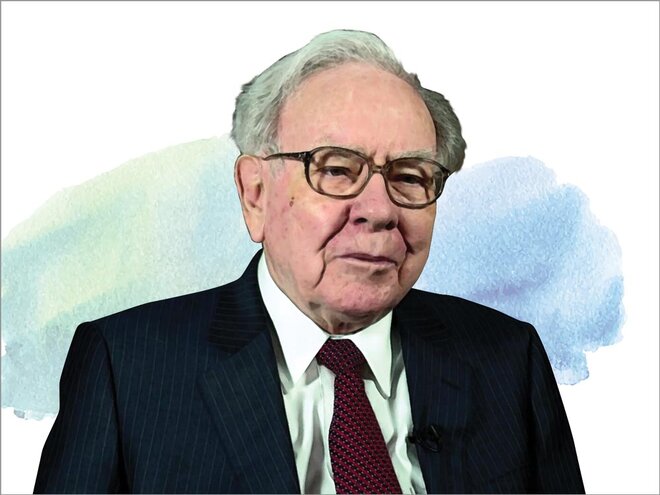
The magic of retained earnings
Charlie and I view Berkshire's holdings of marketable stocks - at yearend worth $281 billion - as a collection of businesses. We don't control the operations of those companies, but we do share proportionately in their long-term prosperity. From an accounting standpoint, however, our portion of their earnings is not included in Berkshire's income. Instead, only what these investees pay us in dividends is recorded on our books. Under GAAP, the huge sums that investees retain on our behalf become invisible.
What's out of sight, however, should not be out of mind: Those unrecorded retained earnings are usually building value - lots of value - for Berkshire. Investees use the withheld funds to expand their business, make acquisitions, pay off debt and, often, to repurchase their stock (an act that increases our share of their future earnings). ...retained earnings have propelled American business throughout our country's history. What worked for Carnegie and Rockefeller has, over the years, worked its magic for millions of shareholders as well.
Of course, some of our investees will disappoint, adding little, if anything, to the value of their company by retaining earnings. But others will over-deliver, a few spectacularly. In aggregate, we expect our share of the huge pile of earnings retained by Berkshire's non-controlled businesses (what others would label our equity portfolio) to eventually deliver us an equal or greater amount of capital gains. Over our 56-year tenure, that expectation has been met.
Buffett's mistake
The final component in our GAAP figure - that ugly $11 billion write-down - is almost entirely the quantification of a mistake I made in 2016. That year, Berkshire purchased Precision Castparts ("PCC"), and I paid too much for the company.
No one misled me in any way - I was simply too optimistic about PCC's normalized profit potential. Last year, my miscalculation was laid bare by adverse developments throughout the aerospace industry, PCC's most important source of customers.
In purchasing PCC, Berkshire bought a fine company - the best in its business. Mark Donegan, PCC's CEO, is a passionate manager who consistently pours the same energy into the business that he did before we purchased it. We are lucky to have him running things.
I believe I was right in concluding that PCC would, over time, earn good returns on the net tangible assets deployed in its operations. I was wrong, however, in judging the average amount of future earnings and, consequently, wrong in my calculation of the proper price to pay for the business.
PCC is far from my first error of that sort. But it's a big one.
The trickery of conglomerates
Berkshire is often labeled a conglomerate, a negative term applied to holding companies that own a hodge-podge of unrelated businesses. And, yes, that describes Berkshire - but only in part. To understand how and why we differ from the prototype conglomerate, let's review a little history.
Over time, conglomerates have generally limited themselves to buying businesses in their entirety. That strategy, however, came with two major problems. One was unsolvable: Most of the truly great businesses had no interest in having anyone take them over. Consequently, deal-hungry conglomerateurs had to focus on so-so companies that lacked important and durable competitive strengths. That was not a great pond in which to fish.
Beyond that, as conglomerateurs dipped into this universe of mediocre businesses, they often found themselves required to pay staggering "control" premiums to snare their quarry. Aspiring conglomerateurs knew the answer to this "overpayment" problem: They simply needed to manufacture a vastly overvalued stock of their own that could be used as a "currency" for pricey acquisitions. ("I'll pay you $10,000 for your dog by giving you two of my $5,000 cats.")
Often, the tools for fostering the overvaluation of a conglomerate's stock involved promotional techniques and "imaginative" accounting maneuvers that were, at best, deceptive and that sometimes crossed the line into fraud. When these tricks were "successful," the conglomerate pushed its own stock to, say, 3x its business value in order to offer the target 2x its value.
Investing illusions can continue for a surprisingly long time. Wall Street loves the fees that deal-making generates, and the press loves the stories that colorful promoters provide. At a point, also, the soaring price of a promoted stock can itself become the "proof" that an illusion is reality.
Eventually, of course, the party ends, and many business "emperors" are found to have no clothes. Financial history is replete with the names of famous conglomerateurs who were initially lionized as business geniuses by journalists, analysts and investment bankers, but whose creations ended up as business junkyards.
Conglomerates earned their terrible reputation.
Charlie and I want our conglomerate to own all or part of a diverse group of businesses with good economic characteristics and good managers. Whether Berkshire controls these businesses, however, is unimportant to us.
It took me a while to wise up. But Charlie - and also my 20-year struggle with the textile operation I inherited at Berkshire - finally convinced me that owning a non-controlling portion of a wonderful business is more profitable, more enjoyable and far less work than struggling with 100% of a marginal enterprise.
For those reasons, our conglomerate will remain a collection of controlled and non-controlled businesses. Charlie and I will simply deploy your capital into whatever we believe makes the most sense, based on a company's durable competitive strengths, the capabilities and character of its management, and price.
If that strategy requires little or no effort on our part, so much the better. In contrast to the scoring system utilized in diving competitions, you are awarded no points in business endeavors for "degree of difficulty." Furthermore, as Ronald Reagan cautioned: "It's said that hard work never killed anyone, but I say why take the chance?"








